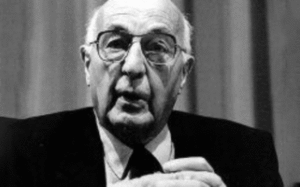Accumulate, accumulate! That is Moses and the prophets! – Lars Syll

In the post-war period, it has become increasingly clear that economic growth has not only brought greater prosperity. The other side of growth, in the form of pollution, contamination, the wastage of resources, and climate change, has emerged as being perhaps the greatest challenge of our time.
Against the mainstream theory’s view on the economy as a balanced and harmonious system, where growth and the environment go hand in hand, ecological economists object that it can rather be characterized as an unstable system which at an accelerating pace consumes energy and matter, and thereby pose a threat against the very basis for its survival.
The Romanian-American economist Nicholas Georgescu-Roegen (1906- 1994) argued in The Entropy Law and the Economic Process (1971) that the economy was actually a giant thermo-dynamic system within which entropy increases inexorably and the material basis of human habitation disappears. If we choose to continue producing things with the techniques we have developed, then our society and a habitable earth environment will disappear faster than it would have if we had introduced small- scale production, resource-saving technologies and limited consumption.
Following Georgescu-Roegen, ecological economists have argued that industrial society inevitably leads to increased environmental pollution, energy crisis and an unsustainable growth.
Today we really need to reconsider how we look upon how our economy influences the environment as a whole and climate change. And we need to do it fast. Nicholas Georgescu-Roegen gives us a good starting point for doing so!
Reference:
Comments; ghholtham
Oct 23, 2019
It is a pleasure, and a slight relief, to be able to agree entirely with Lars Sylls. We do need to consider the impact of economic activity on the environment.
There has in fact been quite a lot of writing about the application of thermodynamic principles to economics since Georgescu-Rogen, by people like Duncan Foley in economics and Quevedo in physics. I am not sure Lars would like it very much because it still treats the economy as a closed system and ignores the role of materials and pollution in production. That has come into focus as a result of current ecological concerns. People were not too wrong in thinking that most mineral resources were plentiful but were wrong in supposing the earth and its ecosystems had an unlimited capacity to absorb human activity without serious disturbance.
The standard solution to the “tragedy of the commons” is to allocate property rights giving someone an incentive to preserve their asset. That is not going to work with the global atmosphere or the global temperature. Collective action is essential. When we see the difficulty there is in forming political coalitions for change because of disputes over the distribution of responsibility you do fear there is just enough truth in the caricature homus economicus for us to be doomed.






























